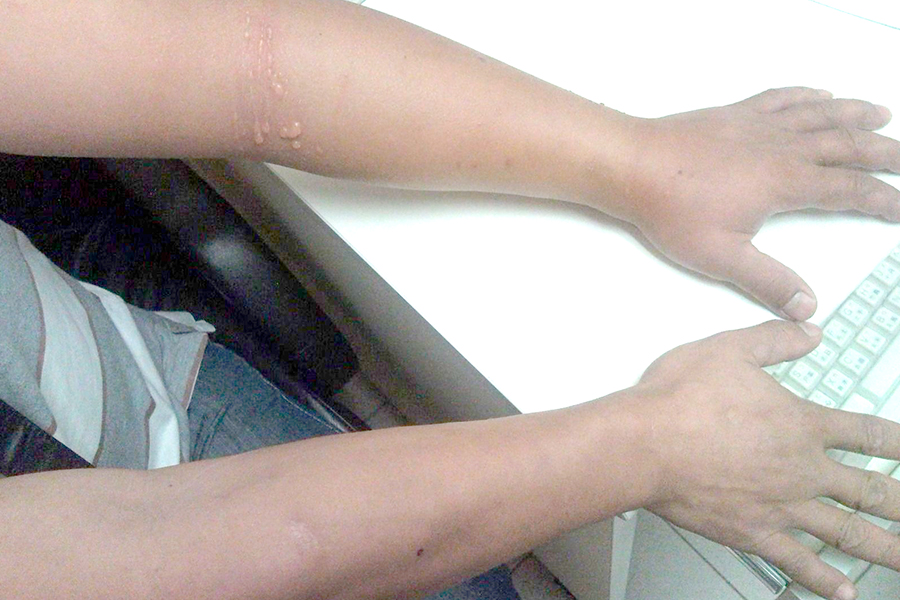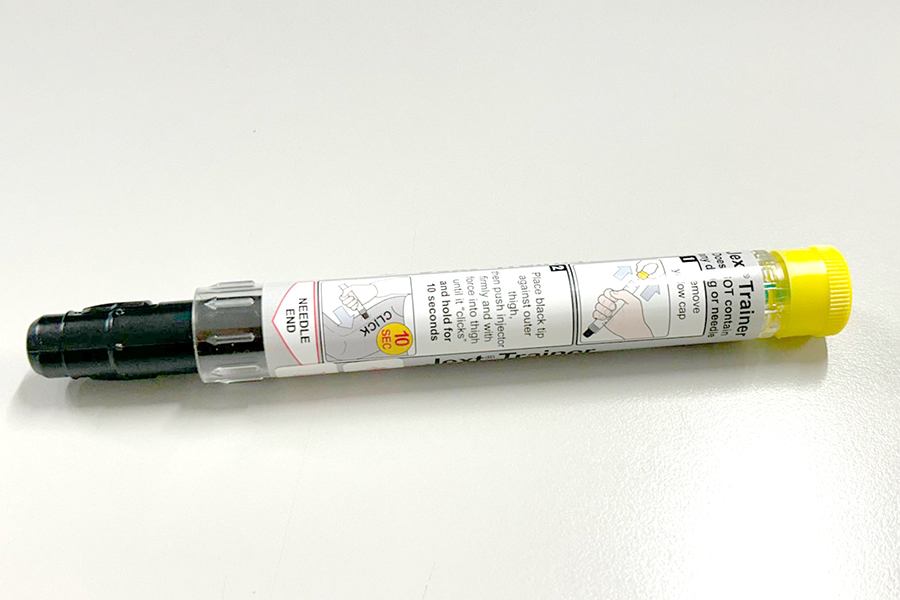
Autumn and winter are ideal seasons for hiking. However, in recent years, there have been fatal cases in Hong Kong involving individuals stung by bees in the countryside. The Hong Kong Poison Control Center (HKPCC) recorded an average of about 100 cases annually of suspected insect stings incidents attending the accident and emergency (A&E) departments, most commonly involving bee or wasp stings. While most people experience mild symptoms such as redness, swelling, and pain, a few may develop severe allergic reactions, including shortness of breath or even fainting, which can be life-threatening without prompt treatment.
Symptoms:
Reactions to bee or wasp stings may vary from person to person. Common symptoms include redness, swelling, pain, and itchy skin, which usually subside gradually over time. However, some individuals may develop allergic reactions within minutes after being stung, typically presented as itchy skin and rashes. Severe cases can present with shortness of breath, low blood pressure, nausea, dizziness, fainting, and even cardiac arrest. If a person is attacked by a large number of bees or wasps, the toxins may accumulate in the body, leading to severe poisoning that may trigger heart attack or stroke.
Immediate treatment:
Bees have barbed stingers that remain attached in the skin along with their venom sac after stinging. You can remove the stinger by gently scraping it out with a card, such as credit card, or using tweezers to pull it out. Avoid using your fingers to remove the stinger, as this may squeeze the venom into the skin. Wasps, on the other hand, do not have barbed stingers and thus will not leave their stingers behind. After a sting, you can wash the affected area with clean water and apply an anti-itch cream.
Treatment options:

Doctors will provide supportive treatment and may administer anti-allergy medicines, steroids, or adrenaline if necessary. Individuals who are known to have severe allergic reactions to bee or wasp stings should consult a doctor for a prescription of a disposable portable adrenaline auto-injector. In the event of a sting, they should use the auto-injector immediately by injecting adrenaline into the outer thigh to relieve the allergic symptoms, and report to the police for immediate assistance.
Precautions:
It is important to follow proper outdoor etiquette when engaging in outdoor activities. Avoid disturbing animals, insects, or their nests, and refrain from touching plants.
 Autumn and winter are ideal seasons for hiking. However, in recent years, there have been fatal cases in Hong Kong involving individuals stung by bees in the countryside. The Hong Kong Poison Control Center (HKPCC) recorded an average of about 100 cases annually of suspected insect stings incidents attending the accident and emergency (A&E) departments, most commonly involving bee or wasp stings. While most people experience mild symptoms such as redness, swelling, and pain, a few may develop severe allergic reactions, including shortness of breath or even fainting, which can be life-threatening without prompt treatment.
Autumn and winter are ideal seasons for hiking. However, in recent years, there have been fatal cases in Hong Kong involving individuals stung by bees in the countryside. The Hong Kong Poison Control Center (HKPCC) recorded an average of about 100 cases annually of suspected insect stings incidents attending the accident and emergency (A&E) departments, most commonly involving bee or wasp stings. While most people experience mild symptoms such as redness, swelling, and pain, a few may develop severe allergic reactions, including shortness of breath or even fainting, which can be life-threatening without prompt treatment.
 Doctors will provide supportive treatment and may administer anti-allergy medicines, steroids, or adrenaline if necessary. Individuals who are known to have severe allergic reactions to bee or wasp stings should consult a doctor for a prescription of a disposable portable adrenaline auto-injector. In the event of a sting, they should use the auto-injector immediately by injecting adrenaline into the outer thigh to relieve the allergic symptoms, and report to the police for immediate assistance.
Doctors will provide supportive treatment and may administer anti-allergy medicines, steroids, or adrenaline if necessary. Individuals who are known to have severe allergic reactions to bee or wasp stings should consult a doctor for a prescription of a disposable portable adrenaline auto-injector. In the event of a sting, they should use the auto-injector immediately by injecting adrenaline into the outer thigh to relieve the allergic symptoms, and report to the police for immediate assistance.